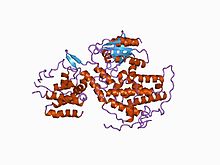RasGEF domain
| RasGEF domain | |||||||||||
|---|---|---|---|---|---|---|---|---|---|---|---|
 Structure of human H-Ras.[1] | |||||||||||
| Identifiers | |||||||||||
| Symbol | RasGEF | ||||||||||
| Pfam | PF00617 | ||||||||||
| InterPro | IPR001895 | ||||||||||
| SMART | RasGEF | ||||||||||
| PROSITE | PDOC00594 | ||||||||||
| SCOP2 | 1bkd / SCOPe / SUPFAM | ||||||||||
| OPM protein | 1xd4 | ||||||||||
| CDD | cd00155 | ||||||||||
| |||||||||||
RasGEF domain is domain found in the CDC25 family of guanine nucleotide exchange factors for Ras-like small GTPases.
Ras proteins are membrane-associated molecular switches that bind GTP and GDP and slowly hydrolyze GTP to GDP.[2] The balance between the GTP bound (active) and GDP bound (inactive) states is regulated by the opposite action of proteins activating the GTPase activity and that of proteins which promote the loss of bound GDP and the uptake of fresh GTP.[3][4] The latter proteins are known as guanine-nucleotide dissociation stimulators (GDSs) (or also as guanine-nucleotide releasing (or exchange) factors (GRFs)). Proteins that act as GDS can be classified into at least two families, on the basis of sequence similarities, the CDC24 family (see InterPro: IPR001331) and this CDC25 (RasGEF) family.
The size of the proteins of the CDC25 family range from 309 residues (LTE1) to 1596 residues (sos). The sequence similarity shared by all these proteins is limited to a region of about 250 amino acids generally located in their C-terminal section (currently the only exceptions are sos and ralGDS where this domain makes up the central part of the protein). This domain has been shown, in CDC25 an SCD25, to be essential for the activity of these proteins.
Human proteins containing this domain
[edit]KNDC1; PLCE1; RALGDS; RALGPS1; RALGPS2; RAPGEF1; RAPGEF2; RAPGEF3; RAPGEF4; RAPGEF5; RAPGEF6; RAPGEFL1; RASGEF1A; RASGEF1B; RASGEF1C; RASGRF1; RASGRF2; RASGRP1; RASGRP2; RASGRP3; RASGRP4; RGL1; RGL2; RGL3; RGL4/RGR; SOS1; SOS2;
References
[edit]- ^ Boriack-Sjodin PA, Margarit SM, Bar-Sagi D, Kuriyan J (July 1998). "The structural basis of the activation of Ras by Sos". Nature. 394 (6691): 337–43. Bibcode:1998Natur.394..337B. doi:10.1038/28548. PMID 9690470. S2CID 204998911.
- ^ McCormick F, Bourne HR, Sanders DA (1991). "The GTPase superfamily: conserved structure and molecular mechanism". Nature. 349 (6305): 117–127. Bibcode:1991Natur.349..117B. doi:10.1038/349117a0. PMID 1898771. S2CID 4349901.
- ^ McCormick F, Boguski MS (1993). "Proteins regulating Ras and its relatives". Nature. 366 (6456): 643–654. Bibcode:1993Natur.366..643B. doi:10.1038/366643a0. PMID 8259209. S2CID 4338237.
- ^ Downward J (1992). "Ras regulation: putting back the GTP". Curr. Biol. 2 (6): 329–331. doi:10.1016/0960-9822(92)90897-J. PMID 15335949. S2CID 21826028.
Further reading
[edit]- Boguski, MS; McCormick, F (1993). "Proteins regulating Ras and its relatives". Nature. 366 (6456): 643–54. Bibcode:1993Natur.366..643B. doi:10.1038/366643a0. PMID 8259209. S2CID 4338237.
- Quilliam, LA; Khosravi-Far, R; Huff, SY; Der, CJ (1995). "Guanine nucleotide exchange factors: Activators of the Ras superfamily of proteins". BioEssays. 17 (5): 395–404. doi:10.1002/bies.950170507. PMID 7786285. S2CID 22140430.
- Li, N; Batzer, A; Daly, R; Yajnik, V; Skolnik, E; Chardin, P; Bar-Sagi, D; Margolis, B; Schlessinger, J (1993). "Guanine-nucleotide-releasing factor hSos1 binds to Grb2 and links receptor tyrosine kinases to Ras signalling". Nature. 363 (6424): 85–8. Bibcode:1993Natur.363...85L. doi:10.1038/363085a0. PMID 8479541. S2CID 4323174.
- Skolnik, EY; Batzer, A; Li, N; Lee, CH; Lowenstein, E; Mohammadi, M; Margolis, B; Schlessinger, J (1993). "The function of GRB2 in linking the insulin receptor to Ras signaling pathways". Science. 260 (5116): 1953–5. Bibcode:1993Sci...260.1953S. doi:10.1126/science.8316835. PMID 8316835.
